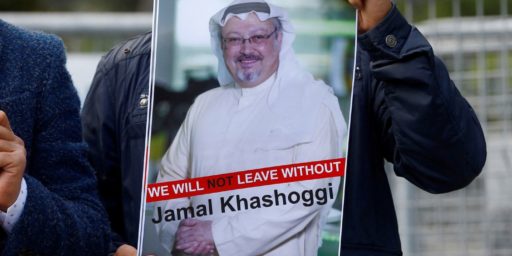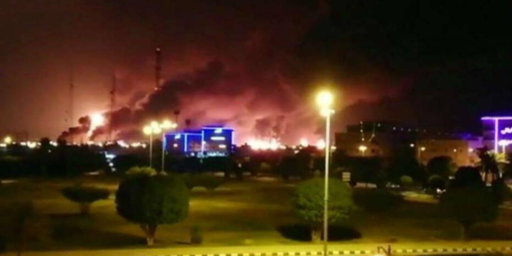Are the Saudis running out of oil?

There’s an interesting post over at The Oil Drum from Stuart Staniford about decreasing Saudi oil production (hat tip: Mary Madigan). Lots of graphs if you’re interested in such things. Here are his conclusions:
- Saudi Arabian oil production is now in decline.
- The decline rate during the first year is very high (8%), akin to decline rates in other places developed with modern horizontal drilling techniques such as the North Sea.
- Declines are rather unlikely to be arrested, and may well accelerate.
- Matt Simmons appears to be right in Twilight in the Desert, but the warning did not come until after declines had actually begun.
Oil economist James Hamilton had made similar observations a couple of weeks ago at his blog, Econbrowser:
This is a potentially huge story that is not being adequately investigated by the financial press.
The future of world oil depends critically on what happens in Saudi Arabia. The country’s importance comes not just because it accounts for more than 10% of global production, but moreover from the fact that it produces almost a quarter of the oil globally available for export. Furthermore, nearly a third of the increase in global production by 2010 that is assumed in the EIA’s reference case forecast is supposed to come from Saudi Arabia.
I think we should avoid too much schadenfreude at this news. The Saud family doesn’t have anything to worry about nor do other wealthy families in the KSA. They’ve used the oil money to buy a lot of other assets. And wealthy Saudis who are inclined to fund terrorism will continue to have plenty of money to do it with.
Most people in the KSA don’t belong to those families and, if growth slows, they may be in very dire straits indeed. IMO that will produce more radical Islamism not less.
Second, the pressure that the Saudis have been able to put on Iran by modulating the world’s total oil supply has been an important weapon against the regime. If the Saudis’ oil is decreasing faster than the Iranians’, it may render that less effective.
Also, this may tend to make Russian and Central Asian oil that much more important in the future. I’m not sure that’s particularly good news.
Interesting times.






Dave,
I’m surprised that neither the posts you refer to nor your post discuss the current prices of oil. The relevant question is whether current prices are reflecting a level of Saudi oil reserves lower than just a few years ago. Given that for a few months oil prices had been above their current values, one might argue that it was due to a sudden doubt about the level of Saudi reserves and the subsequent drop of prices to the realization that these reserves are enough to keep prices at the new levels. Indeed a serious analysis should take account of other forces but they were not discussed in the posts you refer to. I cannot understand a market analysis that does not discuss prices.
I guess it’s easy to dismiss it as ‘taqqiya’, but the Saudis are claiming not only new oil fields, but also new unproven reserves.
Edgardo: The oil price rises we’ve seen are far better and more easily explained by the explosive growth in demand by China and India than by the KSA’s running low.
I think this supported by the efforts of both the Chinese and Indians over the last year to lock in oil sales directly with the KSA.
If people are waiting for the KSA to collapse because it’s running out of oil, they’re going to have to wait quite a while.
If the world demand had been growing explosively, prices would have continued increasing.
But demand is also seasonal. When it was expected that winter would be extremely cold, prices went up. When winter turned out to be mild, they dropped. When there was suddenly a lot of snow, prices were up again.
The supply of oil is only one of the factors that affect the price. Increasingly, it seems like one of the smaller factors as marketers and those who try to play the market inject their own costs.
Are the Saudis running out of oil? Yes. They keep pumping it out of the ground, so they must be running out. Next question.
I think this supported by the efforts of both the Chinese and Indians over the last year to lock in oil sales directly with the KSA.
Gosh but this would call into question the very logic of striving for “energy independence” as a blow against terrorism.
I think we should avoid too much schadenfreude at this news. The Saud family doesn’t have anything to worry about nor do other wealthy families in the KSA. They’ve used the oil money to buy a lot of other assets. And wealthy Saudis who are inclined to fund terrorism will continue to have plenty of money to do it with.
Moved from wrong thread. – jhj
I tend to believe that “energy independence” is a bit of a will o’ the wisp, Jim. There’s a global market for oil and it operates with remarkable efficiency. The same is true for coal, gas, and uranium. Even if we went totally to wind, solar, or geothermal we’d still be influenced by global energy markets.
The only way to achieve complete energy independence is through a policy of autarky which has been a disaster for every country that’s tried it.
It’s either serendipity or Dave has a source deep inside The New York Times!
Today, The Times runs a piece: Oil Innovations Pump New Life Into Old Wells that speaks to the very issue.
There’s a nice graphic on the page that illustrates Saudi reserves. The piece notes that as the price of oil increases, so do the reserves–a theory well demonstrated by Julian Simon in his bet with Paul Ehrlich in 1980.
The bottom line: given anticipated breakthroughs in technology and the right price, the KSA might be holding as much as 1 trillion barrels, roughly 10 times current reserves.
Exciting times, indeed.
Exciting times indeed!.